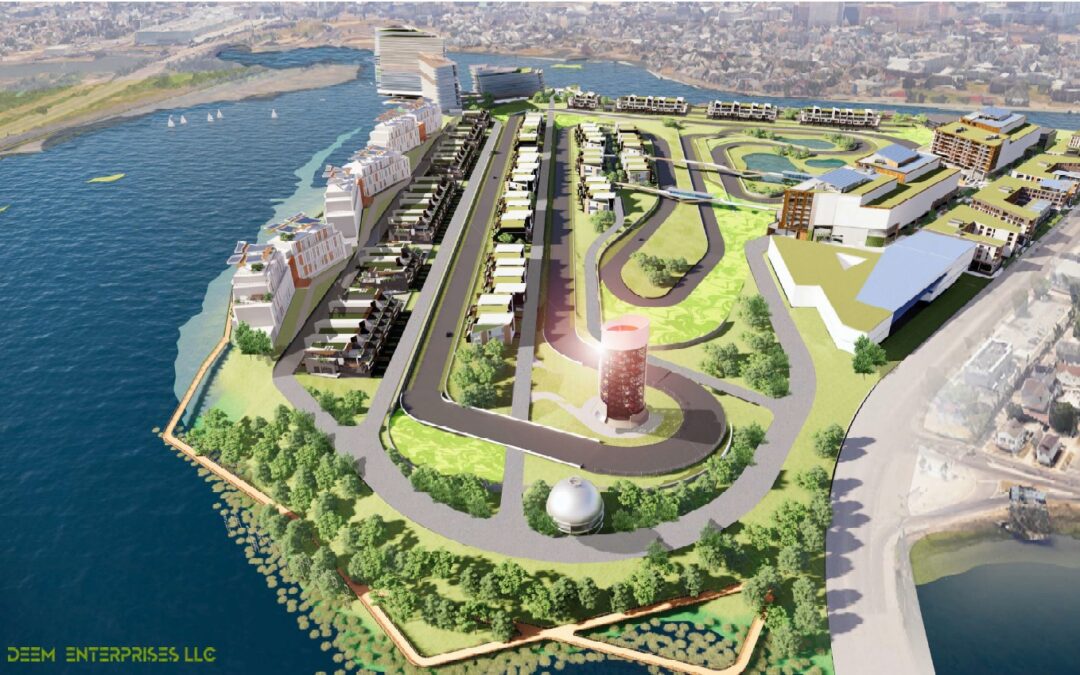Multi-billion-dollar, racing-themed development taking shape at the former Bader Field
In a new film in theaters, Brad Pitt stars as a Formula 1 driver who comes out of retirement to mentor a younger driver.
What does “F1” have to do with Atlantic City? Nothing. Formula 1, considered the pinnacle of motorsport, will not be adding Atlantic City to its popular international race schedule. But down the road, a replica of a track layout is expected to be part of an almost $4 billion automobile-themed development for the uber rich on the site of the former municipal airport, Bader Field.
The wealthy with as much as $4 million to spare, will be able to gain entry into this exclusive club planned by DEEM Enterprises, LLC. Entry comes with the right to drive on replicas of various race tracks, from various race series, including Formula 1. The rest of us can watch and admire the rich drivers of Ferraris or Lamborghinis, according to COO, Michael Binder, the M in DEEM Enterprises.
The proposed development, known as Renaissance at Bader Field, would surround the track with condos for cars and their owners, shopping and dining opportunities, a hotel and an auto-based educational facility to train local residents to care for cars.
If you happen to have the money to buy a condominium there’s no need to rush. DEEM has a few details to take care of before a shovel can break ground, including approval of the construction plans from the City of Atlantic City and the state Department of Community Affairs.
“DCA is a partner with Atlantic City in its review of the financial impact of any redeveloper agreement pertaining to this project area,” said Lisa M. Ryan, a spokeswoman for the DCA. “Negotiations with the designated redeveloper are ongoing.”
Binder hopes the documents will be signed and sealed before the year ends.
“Both have to sign off on the methodology, cleanup, horizontal construction and vertical construction,’’ he said. Documents require an environmental remediation plan to clear out contaminated soil, for example.
The city signed a six-month memorandum of understanding in 2023, said Andrew Kramer Atlantic City public information officer. DEEM gave the city a financial commitment earlier this year, which the municipality and DCA are working on.
“The next step would be a redevelopment agreement,” Kramer said. Once horizontal construction begins, DEEM will put the condos up for sale.
The 143-acre Bader Field opened in 1910 as one of the nation’s first airports and the first such municipal facility. When the airport closed in 2006, the city had no luck finding an adequate buyer.
The grounds have been used for festivals and concerts. A minor league baseball team called the Atlantic City Surf played there for several seasons at the Sandcastle stadium, and the Flyers constructed the Skate Zone skating rink.
More permanent ideas have come and gone, including gambling.
“It would greatly benefit the city to have something developed on the property,” said Michael Busler, finance program chairman for Stockton University. “Some developers have suggested a mixed-use development, mostly of residential units at various price points, but these never seem to get off the ground.”
Previous proposals failed because there was no solution to elevating Bader Field at the time, Kramer said. “Nor did developers have enough funding to pay for their projects.”
DEEM said engineers and financiers have gotten both issues under control. Both the stadium and rink will come down as part of the overall development.
After remediation, the tract will be elevated to 35 feet at one end and 7 feet on the other to withstand flooding. The Army Corps of Engineers will dredge surrounding back bays and use the spoils for elevation.
Once the redevelopment agreement is approved, Atlantic City stands to gain $115 million as part of the deal, including as much as $15 million toward building a new recreation center in town. DEEM will also construct a new firehouse.
A microgrid will generate electricity and distribution for the project. The development will also use a network operations center, allowing IT teams to manage and monitor Renaissance. For instance, Binder said the team will turn off lighting when owners leave their condos and turn the power back on upon return.
In the past several years, DEEM has refined the scope of the development, added some components and subtracted others, but kept the overall plan as is.
“The vision has not changed,” Binder said.
Some residences will include car storage on site, tied to the condo space. “Living spaces wrapped around a car or two. A $60 million Ferrari wrapped around another Ferrari. Like a collector of cars instead of paintings.
“You have 150 cars looking for a place for that lifestyle shared interest, residing in the development,” Binder said. “Some owners might take their car out and drive to the beach or casinos, but 80-85% won’t.”
Once the land acquisition concludes and DEEM has control of the land, sales can begin, Binder said. These kinds of refinements added to the cost of $3.4 billion with a seven-year build-out span.
“We’ll pre-sell everything before it goes vertical, and that comes without a marketing plan. There is such a demand for this,” he said. “We also anticipate a branding/licensing agreement with Lamborghini. Details and cost have not been defined as yet.”
The site plan overall has not changed, but the configuration has; some smaller, some larger. The track usage will be carefully segregated by type of vehicle and capability when in use. There will also be storage for up to 2,000 vehicles of all types.
Track and amenities aside, the project includes an affordable housing component, a museum, marina-related events, retail and interactive events, e-gaming events, restaurant and entertainment events – all in addition to anything related to motorsports.
“Event programming is in the very early stages of development,” Binder said. “There are many areas for the public to observe the cars that in no way have an impact on driver attention or privacy.”
There would be plenty of public viewing areas along Albany Avenue. Two parking garages have been added to the development plan for the retail customers and event observers.
Given its location in Chelsea, what about the noise from the well-oiled machines? Owners are bound to rev their engines on the tracks.
Noise monitors have been in place for 2.5 years. The track bowl will include sound absorption construction and soil landscaping. Fiberglass building material would be included with sound-absorbing capability.
Will Renaissance at Bader Field work any better than the other ideas floated along the empty field over the years? Binder has no doubts.
“This should be a catalyst for redevelopment throughout Atlantic City for years,” he said.
Stockton’s Busler isn’t so certain.
“I am not sure whether it makes economic sense. But if they are willing to pay the price to acquire the property and they are willing to spend a large sum to develop the property, I say let them try.”
William Sokolic is a veteran journalist who has written for daily, weekly and monthly publications. He’s covered a wide range of news, features and entertainment stories. Much of his work concerns tourism, Atlantic City, and the gaming industry.













